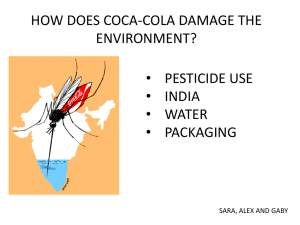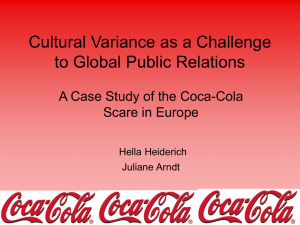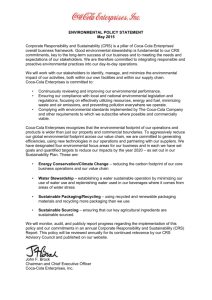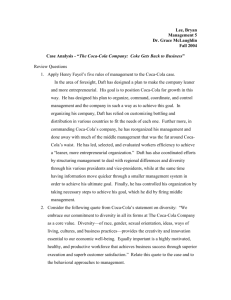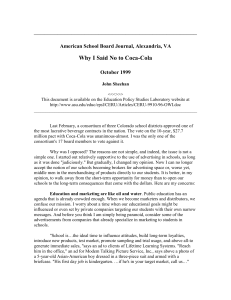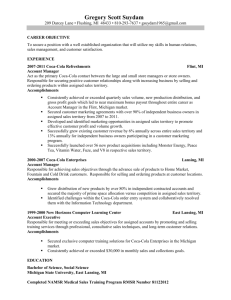Improving Food Safety Across Supply Chain in Coca
advertisement
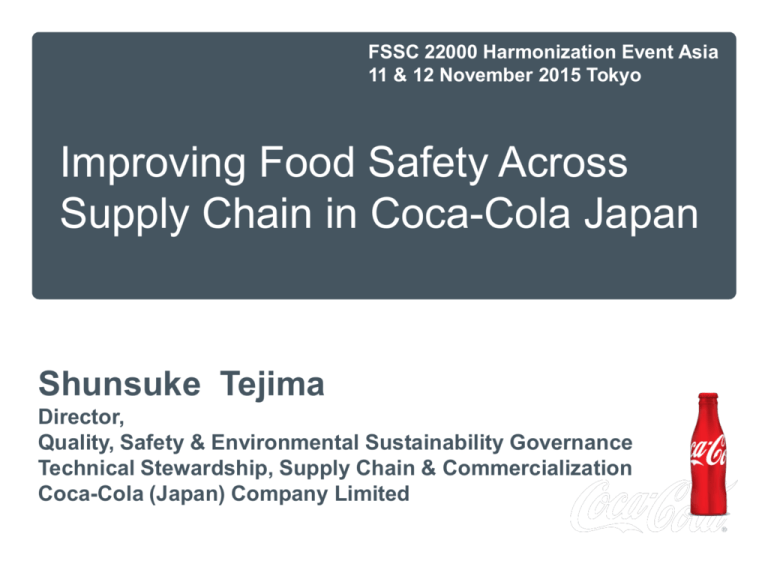
FSSC 22000 Harmonization Event Asia 11 & 12 November 2015 Tokyo Improving Food Safety Across Supply Chain in Coca-Cola Japan Shunsuke Tejima Director, Quality, Safety & Environmental Sustainability Governance Technical Stewardship, Supply Chain & Commercialization Coca-Cola (Japan) Company Limited 1 Agenda 1. Introduction Japan Coca-Cola System 2. Complexity of Supply Chain 3. GFSI Scheme Certification Status 4. Next Challenge 5. Opportunity for FSSC22000 2 129 May 8, 1886 YEARS 3 Robert Woodruff was elected the president of The Coca-Cola Company Patented contour bottle Six carton 1924 Coca-Cola invented what is said to be the world’s first coupon 1916 First bottle Late 1800 in Atlanta, Georgia in 1886 1923 Dr. John Pemberton invented Coca-Cola 1896 1886 Innovation and an entrepreneurial spirit has always been in Coca-Cola’s DNA 4 Partner of the Olympics since 1928 Classified - Unclassified 5 The Keep Japan Beautiful (KJB) initiative is promoted The Coca-Cola system played a central role in this beautification campaign aimed at preventing littering of empty containers after consumption. Besides local clean-up activities, bottling partners donated waste receptacles to local governments for placing by vending machines and undertook collection of empty containers. To develop these activities further ,The Beverage Industry Environment Beautification Association was jointly established with other corporations as well as breweries. Bottling companies begin operations nationwide in Japan. Vending machines are introduced to the marketplace in Japan. The first step towards securing the top share in the Japanese market —the Coca-Cola system’s vending machines now number around 980,000. The first machines involved inserting money and manually removing a bottle of Coca-Cola. The sports drink, Aquarius, is launched. 1993 1975 Canned Coca-Cola (250ml) first appears in Japan. The Coca-Cola Company becomes an Official Partner of the FIFA World Cup ™. 1983 1978 Tokyo hosts the Olympic Games. 1965 1963 1973 TV commercials begin airing in Japan. 1964 1962 The first Coca-Cole Bottling partner in Japan starts Operations Nihon Inryo Kogyo K.K. (predecessor of Coca-Cola (Japan) Co., Ltd.) is established. 1961 1957 58 years in Japan since 1957 Georgia is launched. Sokenbicha is launched. Plastic replaces aluminum as the material for making PET bottle caps. Removal of refrigerant HFCs from vending machines begins. 6 Coca-Cola operates in more than 200 countries globally and Japan is among our 5 largest markets by volume #1 U.S. #2 Mexico #3 China #4 Brazil #5 Japan 7 One product, one package until Classified - Unclassified 1955 8 2015 3,500+ products globally; 850+ products from 50+ brands in Japan Coca-Cola Coca-Cola Zero Coca-Cola Life Fanta Grape Sports drinks Aquarius Active lifestyle beverages Juice drinks Sparkling beverages Sprite Schweppes Citrus Canada Dry Ginger Ale Minute Maid Asa no Kenko Kajitsu Orange Blend Minute Maid Asa Banana Minutes Maid Qoo Waku-waku Orange glacéau Vitaminwater xxx Tea Aquarius Zero Aquarius Vitamin Toreta! Ayataka Sokenbicha Japanese Oolong tea Tsumugi Kocha Kaden Royal Milk Tea Karada Meguricha Water Coffee Georgia Georgia European Emerald Mountain Shifuku no Bito Blend Taiyo no Mate-cha Georgia Emerald Mountain Blend Black Georgia European Kaoru Black Georgia European Jukuren Blend Georgia European Koku no Bito Karada Sukoyakacha W Energy drinks Georgia European Premium Café Late Real Gold I LOHAS I LOHAS Mikan I LOHAS Sparkling Lemon I LOHAS MOMO 9 Four of The Coca-Cola Company’s 20 billion-dollar brands worldwide were born in Japan 10 The Coca-Cola Japan System 7 bottlers in Japan 1. Hokkaido Coca-Cola Bottling Co., Ltd. 2. Michinoku Coca-Cola Bottling Co., Ltd. 3. Coca-Cola East Japan Co., Ltd 4. Hokuriku Coca-Cola Bottling Co., Ltd. 5. Shikoku Coca-Cola Bottling Co., Ltd. 6. Coca-Cola West, Co., Ltd 7. Okinawa Coca-Cola Bottling Co., Ltd. Coca-Cola (Japan) Co. Planning R&D Concentrate production 7 bottlers Product production Logistics Sales Bottle collection Recycling Coca-Cola Tokyo R&D Center 11 Plant Location 22 FBO Bottling Plants 30 Approved Co-Packers 12 Complexity of Supply Chain …….Our supply chain plays a critical part in accelerating performance to meet 2020 goals Raw Materials Production Distribution Customer/ Consumer Waste Capture Ensure Quality & Food Safety Across Entire Supply Chain While: Maintaining Quality in a Rapidly Evolving Business Environment Producing Products Compliant to Increasing Regulatory Requirements & Consumer Expectations Japanese consumer are very sensitive to product Quality. 13 Product Complexity in Japan The Size of The Japan Beverage Market is about 9.4 Bn UC RTD accounts for around 38% out of the Total Alcohol 17% 38% RTD Non-RTD Total 9.4 Bn uc 45% Non-RTD RTD RTD 3,9% 0,2% Green Tea Coffee 23,6% 24,7% Milk Black Tea Oolong Tea Others 4,9% 2,8% Sparkling 16,2% Coffee 17,3% Juice Total 4.3 Bn uc 6,7% 2,6% 1,7% 7,6% Total 3.6 Bn uc 14,5% Sports 10,6% 35,6% 27,2% Tea Energy Water Others 14 Food Safety across E2E Supply Chain Supplier GFSI Scheme Certification Bottling Plant GFSI FSSC22000 Certification Customer GFSI 15 Management System Requirement ISO 9001:2008 FSSC 22000 ISO 14001:2004 OHSAS 18001:2007 Any GFSI Approved Scheme Commercial Product Supply(CPS) C C C C N/A Fountain/Bottling Manufacturing C C C C N/A Co-Packers C* N/A I I C* Manufacturing of other Food Products C C I I N/A Distribution Operations I I I I N/A Warehousing I I I I N/A Fountain/Vending Operations I I I I N/A C=Certification I =Implementation N/A=Not Applicable *SQF level3 certification is accepted as equivalent to ISO 9001 and Food Safety Certification for Co-packers 16 Food Safety Requirement for Supplier The following Suppliers must obtain certification to one of GFSI-recognized food safety management scheme Ingredient Suppliers(Company Purchase) • Dairy Products(Milk, Powder, Cream etc.) • Agricultural(Tea, Coffee, Juice etc.) • Others Ingredient Suppliers(Bottler Purchase) • Carbon Dioxide • Sweetener(Granular Sucrose, HFSS etc.) Primary Packaging Suppliers 17 17 GFSI Scheme Certification Status Manufacturing 100% Manufacturing Plants in Japan are FSSC22000 certified. (28 manufacturing plants completed at end of March in 2011) Co-Packers 100% Co-Packers in Japan are FSSC22000 certified.(31 copackers completed at end of 2013) Ingredient Suppliers 100% Company Ingredient suppliers(110) are GFSI scheme certified. 100% Bottler Purchase Ingredient suppliers are FSSC22000 certified.(24 sweetener and 5 Carbon Dioxide supplier plants completed at end of June, 2012) Primary Package Suppliers 100% Primary Packaging Suppliers are FSSC22000 certified. (74 supplier plants completed at end of 2012) 18 Next Challenge(Ex. Green Tea) GFSI Scheme Certification Current Final Packing Plant Tea Growers Crude Tea Processors Tea Blenders 1st. Tier Suppliers CCJC 1st. Tier Suppliers CCJC Future Final Packing Plant Tea Growers Crude Tea Processors Tea Blenders ※Sustainable Agriculture Guiding Principles(SAGP) Authorization by 3rd. Party(J-GAP) 19 Sustainable Agriculture Guiding Principles LAY THE FOUNDATION FOR “SUSTAINABLY SOURCED” EXPECTATIONS Human and Workplace Rights 1. Freedom of Association and Collective Bargaining 4. Work Hours and Wages 5. Safe and Healthy Workplace 2. Prohibit Child, Forced or Abuse of Labor 6. Community and Traditional Rights 3. Eliminate Discrimination Environment 7. Water Management 10. Soil Management 8. Energy Management and Climate Protection 11. Crop Protection 9. Conservation of Natural Habitats and Ecosystems Farm Management Systems 12. Harvest & Postharvest Handling 13. Reproductive Material Identity, Selection & Handling 14. Management Systems, Record Keeping and Transparency 15. Business Integrity 20 20 Coca-Cola’s 2020 Sustainable Agriculture Goals and Commitments Global Goal: 100% of priority commodities meet SPGP Sweeteners: Fruit: Orange Lemon Sugar (Cane) Sugar (Beet) Corn (HFSS) Grape Stevia Mango Apple Other: Tea Coffee Pulp & Paper (Forestry products) Soy Palm Oil 21 Improve Opportunity for FSSC22000 Improve effectiveness and value of FSSC22000 certification through audit method for surveillance and recertification. (unannounced?) Develop Certification Flexibility Only each site => Multi site certification 22 THANKS Coca-Cola Japan 23

